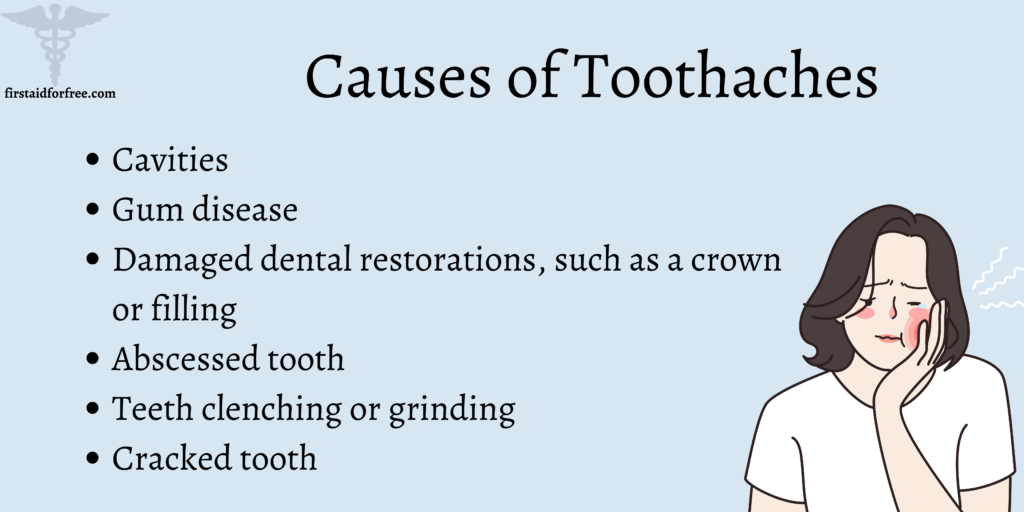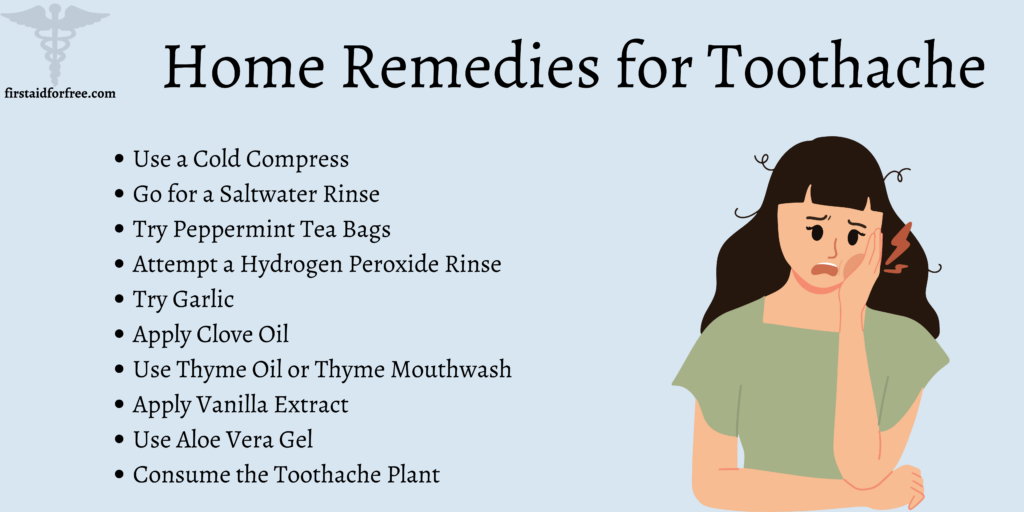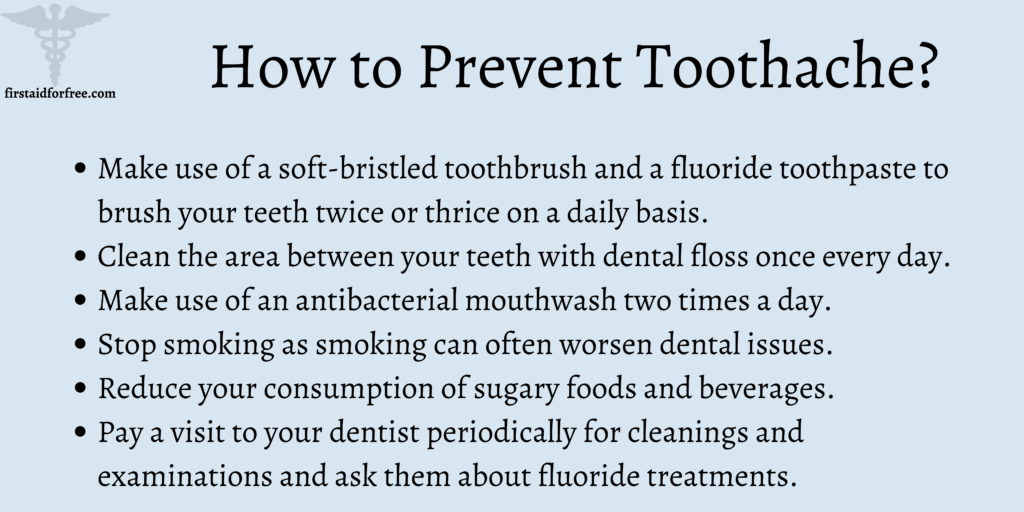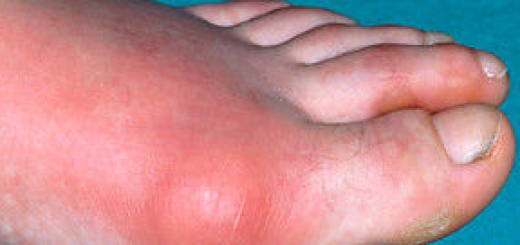Toothache First Aid: 10 Essential First Aid Measures
Did you know that the teeth are the only part of the human body that can’t heal by themselves? I believe that dental health is connected to our overall health in many ways, which is something I have personally witnessed several times.
Suffering from dental issues can be quite unpleasant and painful, and one such example is that of a toothache. When a person feels pain in or around their tooth, it’s known as a toothache.
An individual can experience toothache in multiple ways. They can be constant or even come and go. Some can feel their toothache getting worse at night, especially when they are lying down.
Based on the underlying cause of the toothache, a person can experience various types of tooth pain. The symptoms to expect during toothaches include:
- A dull ache that remains or refuses to go away.
- Throbbing pain.
- Fever.
- Headaches.
- Jabbing and sharp pain.
- Chills.
- Teeth sensitivity.
- Swelling in the gums.
- Bad taste or bad breath.
Have you ever gotten a toothache in the middle of the night and wondered what you can do to reduce the pain? If yes, then this article is for you.
Knowing about toothaches and how they can be cured can help you save yourself and your loved ones from further pain. In this article, we will be discussing the causes of toothaches, when to see a dentist, toothache first aid, and so on.
Causes of Toothaches
There can be several causes behind a toothache, and some of the possible causes are as follows:
- Cavities
- Gum disease
- Damaged dental restorations, such as a crown or filling
- Abscessed tooth
- Teeth clenching or grinding
- Cracked tooth
Home Remedies for Toothache
Before you head over to the dentist, there are certain home remedies you can try as toothache first aid. Those remedies are as follows:
1. Use a Cold Compress
A cold compress can help in treating various sorts of pain, and this also includes toothache. Once a cold compress is applied to the affected region, it leads to the constriction of the blood vessels, which aids in reducing the severity of the pain.
This process also reduces any inflammation and swelling. In order to go for this method, take a bag of ice, wrap it using a towel, and apply it to the affected region for 20 minutes. Repeat the process every couple of hours.
2. Go for a Saltwater Rinse
A saltwater rinse is something many people turn to as go-to method to treat toothache. Since salt water is a natural disinfectant, it helps in getting rid of the debris and food particles that could be stuck in between your teeth.
Salt water helps in healing oral wounds and reduces inflammation. All you need to do to use it as mouthwash is mix half a teaspoon of salt into a glass of warm water.
3. Try Peppermint Tea Bags
If you’re looking to soothe your sensitive gums or numb any pain that rises from a toothache, you can use peppermint tea bags as a first aid treatment. Before you apply it to the affected region, make sure that the used tea bag cools down while still being a bit warm.
Peppermint tea bags can also be used to cool the affected area. For this method, place a used tea bag within the freezer for a few minutes and then apply the tea bag to the affected tooth.
4. Attempt a Hydrogen Peroxide Rinse
Rinsing your mouth with hydrogen peroxide helps in getting rid of inflammation and pain. It helps in killing bacteria, healing bleeding gums, and reducing plaque. Dilute the hydrogen peroxide by mixing 3% of it with equal quantity of water, and then use the concoction as mouthwash.
5. Try Garlic
Garlic is known for its antibacterial properties. Not only does it serve as a pain reliever, but it also helps in killing the bacteria that cause dental plaque.
Create a paste using crushed garlic and apply it to the affected region. You can also add a bit of salt to it, and some even choose to chew on fresh garlic.
6. Apply Clove Oil
Clove oil has been an effective method to deal with toothache for a long time. It helps in reducing inflammation, and numbing the pain, and contains a natural antiseptic known as eugenol.
Make use of a carrier oil such as jojoba or sunflower oil to dilute clove oil. The proportion to keep in mind for this purpose is one ounce of carrier oil to 15 drops of clove oil.
Apply a bit of the diluted oil on a cotton ball to the affected tooth or teeth a few times daily. You can also use clove oil as a mouthwash by adding a drop of it to a small glass of water.
7. Use Thyme Oil or Thyme Mouthwash
While using thyme in cooking is quite common, were you aware that it can also be used as a first aid method for toothache? The active compound it contains, thymol, has antiseptic as well as anti-fungal properties.
Thyme helps in fighting the bacteria that lead to tooth decay. It can either be used in the form of an oil or mouthwash. In order to apply it as an oil, use a carrier oil to dilute thyme essential oil and then proceed to apply it to the affected area.
If you wish to use thyme mouthwash, you can just add a drop of thyme essential oil into a glass of water and then use it the same way you use any kind of mouthwash.
8. Apply Vanilla Extract
Since alcohol is one of the ingredients of vanilla extract, it can help in numbing the pain when you have toothache. With its antioxidant properties, it proves to be competent in terms of healing someone experiencing toothache.
Make sure to use real vanilla instead of artificial vanilla for this purpose. Just apply a small amount of vanilla extract on a cotton ball or your finger to the affected region a couple of times a day.
9. Use Aloe Vera Gel
In addition to healing burns and cuts, aloe vera gel helps in fighting toothache due to the calming effect it has on aching gums. Just take an aloe vera plant and slice off the fleshy part. Scrape off the gel, apply it to the affected region, and wait for the soothing effects to begin.
10. Consume the Toothache Plant
The toothache plant is aptly named so as it’s an effective first aid method for toothache. This particular flowering plant can be found in subtropical and tropical regions, and it contains an active compound named spilanthol which is filled with anti-inflammatory properties. It also leads to a numbing sensation.
All one needs to do to derive the benefits of the toothache plant is chew on it. The following are some of the situations when one shouldn’t consume it:
- If you’re pregnant
- If you drink alcohol
- If you’re allergic to plants in the daisy family
- If you have prostate cancer
- If you use diuretics
How to Prevent Toothache?
Toothaches aren’t always possible to prevent, as they often occur for reasons that are beyond one’s control. However, there are a couple of precautions you can take to reduce the possibility of toothaches:
- Make use of a soft-bristled toothbrush and a fluoride toothpaste to brush your teeth twice or thrice on a daily basis.
- Clean the area between your teeth with dental floss once every day.
- Make use of an antibacterial mouthwash two times a day.
- Stop smoking as smoking can often worsen dental issues.
- Reduce your consumption of sugary foods and beverages.
- Pay a visit to your dentist periodically for cleanings and examinations and ask them about fluoride treatments.
When to See a Dentist?
A person should go see their dentist under the following circumstances:
- If a toothache remains for longer than two days.
- If you experience pain while trying to open your mouth wide.
- If there is any swelling in your jaw or face.
The following situations are when you should visit your local emergency room:
- If you experience bleeding that doesn’t stop even after applying pressure.
- If there is a knot on your jaw or swelling underneath your eye.
- If you have a body temperature of over 38.33 degrees Celsius.
- If you experience immense tooth pain that doesn’t heal even after taking medicines.
FAQs
What causes toothaches?
When the innermost layer of a person’s tooth gets inflamed, it leads to toothache.
Why is tooth pain worse at night?
When a person lies down, more blood rushes to their brain, and this amplifies the tooth pain as compared to when a person is standing.
How long do toothaches last?
Toothaches can last for anywhere between a couple of days to a couple of weeks.
Does brushing teeth help toothache?
Although brushing your teeth doesn’t make the toothache disappear, it’s definitely a preventative measure to avoid toothaches. It is advised to brush your teeth twice or thrice a day.
Is ice good for a toothache?
Applying an ice pack or cold compress does help with toothaches. However, ice shouldn’t be applied directly to the tooth, which hurts as it could increase your toothache.
How should I sleep with tooth pain?
If you have tooth pain, make sure to prop up a few pillows and sleep with your head elevated.
What not to eat during toothache?
The foods to avoid during toothache include soda, hard candy, meat, raw vegetables, and sticky candy.
Are bananas good for your teeth?
Yes, bananas are good for the health of your teeth as they are rich in calcium and vitamin D.
Conclusion
In certain situations, tooth pain goes away on its own. For instance, if a person has irritated gums after biting into something hard, it’s likely that the discomfort will fade away in one or two days. However, a real toothache that originates from a person’s tooth usually requires proper treatment.
Whether your toothache has been with you for a couple of days or if it’s something that comes and goes, you should consult your dentist immediately. The sooner you treat it, the less pain it’s likely to cause. Therefore, see your dentist right away so they can recommend the right treatment.








